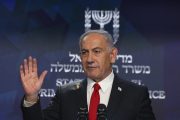
The United Nations (UN) released a policy brief last month proposing an “Emergency Platform,” or set of protocols, that would be automatically activated in response to “global shocks” such as a future pandemic, an economic crisis, or even an outer space event that creates severe worldwide disruptions. The protocols are designed to help the UN achieve their 2030 Agenda for Sustainable Development goals. Member states will vote on the proposal at the Summit of the Future next year.
UN Secretary-General António Guterres outlined in the 28-page brief some of the “characteristics of global shocks in the twenty-first century” and some of the risks the world could face in the future. “The Emergency Platform would not be a standing body or entity but a set of protocols that could be activated when needed,” wrote Guterres.
The policy brief, one of nine to be submitted by July according to a UN press release, has the simple goal “to breathe new life into the multilateral system so that it can deliver on the promises of the United Nations Charter and the 2030 Agenda.” The briefs have met with resistance and criticism from U.S. lawmakers.
The Epoch Times reported:
Among those expressing concern is House Foreign Affairs Committee Chairman Rep. Michael McCaul (R-Texas), whose committee oversees U.S. foreign policy and involvement in international organizations.
“We must be sure that any global protocol or platform operated by the U.N. respects U.S. national sovereignty and U.S. taxpayer dollars,” McCaul told The Epoch Times.
He also noted his concern that the proposed platform expands the authority and funding of the U.N. and the definitions of “emergency” and “crisis” to include, for instance, climate change.
The comprehensive UN brief shared two examples of “global shock” events: the Covid-19 pandemic (2020) and the global cost of living crisis (2022). “The global response to such shocks is often ad hoc, fragmented, and improvised. We need a mechanism to tackle multidimensional threats with a multidimensional response. This policy brief calls for a more formal, predictable, and structured approach. An emergency platform would leverage the UN’s convening power and capacities in a timely and predictable way,” said Guterres.
According to the brief, “We must be ready to respond to a range of different global shocks in the future.” They listed some potential shock examples as:
- Large-scale climatic or environmental events that cause major socioeconomic disruptions and/or environmental degradation;
- Future pandemics with cascading secondary impacts;
- High-impact events involving a biological agent (deliberate or accidental);
- Events leading to disruptions to global flows of goods, people or finance;
- Large-scale destructive and/or disruptive activity in cyberspace or disruptions to
global digital connectivity;
- A major event in outer space that causes severe disruptions to one or several critical systems on Earth;
- Unforeseen risks….
In response to the brief, critics have expressed concern about the Chinese Communist Party’s (CCP) influence within the UN, including known corruption and the poor handling of previous world emergencies, including the Covid pandemic.
The Epoch Times continued:
“Allowing the U.N. to deal with this is the equivalent of putting the CCP in charge of global emergencies,” former U.S. Assistant Secretary of State for International Organizations Kevin Moley told The Epoch Times….
“This U.N. plan flies in the face of the experience we just had with the latest pandemic, which shows why we should reiterate sovereignty, not give more away,” he told The Epoch Times in a phone interview.
Moley, who oversaw the U.S. relationship with international organizations during his time in the Trump administration, has long sounded the alarm about the CCP’s surging influence within the U.N., a process he says has been supported by both the Obama and Biden administrations. He called it an existential threat to the United States.
The overall intent presented in the brief is to allow the UN to strengthen “global governance for both present and future generations.” In other words, the proposal is part of the “Great Reset,” and should be resisted at all costs.
Investigative journalist and WHO expert James Roguski’s response to the policy brief on emergency protocols is a call to action that must not be ignored. He told The Epoch Times, “We the People need to push back against the relentless push for centralized, bureaucratic control that the globalists offer as the solution to the world’s problems. We need to stand up and speak up in support of individual freedoms and national sovereignty.”






